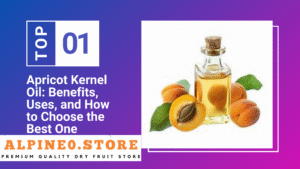Apricot kernel oil organic, organic apricot oil, apricot oil for skin, organic apricot kernel oil benefits, apricot oil cold pressed organic, organic apricot oil for hair, apricot seed oil organic, natural apricot kernel oil, organic cold pressed apricot oil, apricot oil skincare organic

Introduction
Apricot kernel oil, a versatile and nutrient-rich oil pressed from the pits of apricots, has secured a beloved spot in skincare, hair care, and gourmet kitchens. Its lightweight texture and high concentration of beneficial fatty acids make it a standout natural product. This guide explores what apricot kernel oil is, its many uses, its potential benefits, and how to identify a high-quality product for your needs.
Section 1: What is Apricot Kernel Oil?
Apricot kernel oil is a carrier oil extracted from the hard seeds at the center of apricots. It is celebrated for its rich profile of oleic and linoleic acids (Omega-9 and Omega-6), vitamin E, and other micronutrients.
- Types and Processing:
- Cold-Pressed vs. Solvent-Extracted: Cold-pressing is a mechanical method that uses no heat, preserving the oil’s natural nutrients, aroma, and flavor. Solvent extraction may yield more oil but can involve chemicals and high heat, potentially stripping beneficial compounds.
- Refined vs. Unrefined: Unrefined (or virgin) oil retains its characteristic nutty scent and deep golden color, along with more antioxidants. Refined oil is bleached and deodorized, resulting in a lighter color and neutral smell, plus a longer shelf life.
- Common Uses: Its applications are diverse, ranging from a facial moisturizer and gentle massage oil to a hair serum for shine and frizz control. Food-grade versions can be used sparingly in salad dressings or as a finishing oil.
Section 2: How Apricot Kernel Oil Is Made
The extraction method is a key determinant of the final oil’s quality.
- Extraction Methods: The preferred method for high-quality oil is mechanical cold-pressing. For refined oils, the crude oil undergoes further processing steps like degumming, neutralization, bleaching, and deodorization to create a stable, neutral product.
- Quality Indicators:
- Purity: The label should state “100% Pure Apricot Kernel Oil.”
- Color & Scent: Unrefined oil is a pale to golden amber with a subtle, nutty aroma. Refined oil is very pale and nearly odorless.
- Packaging: To protect it from degradation, high-quality oil is always packaged in dark glass or metal containers that shield it from light and heat.
Section 3: Potential Benefits of Apricot Kernel Oil
Note: Individual results will vary. It’s always wise to perform a patch test before widespread skin use and consult a professional for medical advice.
- For Skin: Its excellent emollient properties make it a superb moisturizer for dry or sensitive skin. It absorbs quickly without a greasy feel, helps support the skin’s barrier function, and its vitamin E and fatty acid content may contribute to a smoother, more comfortable complexion.
- For Hair: As a lightweight hair oil, it can tame frizz, add shine, and moisturize a dry scalp without weighing hair down.
- Nutritional Value: When culinary-grade, it provides a source of unsaturated fats and vitamin E. It should be used in moderation, similar to other nut and seed oils.
Section 4: Choosing a High-Quality Oil
When shopping, it’s crucial to know what to look for to ensure you’re getting a pure and effective product. For a benchmark of quality, consider an option like Alpineo’s Organic Apricot Oil, which exemplifies many of these traits.
- What to Look For:
- Clear Labeling: The ingredient list should simply say “100% Prunus Armeniaca (Apricot) Kernel Oil.”
- Extraction Method: “Cold-Pressed” is a sign of a quality-focused process.
- Certifications: Look for USDA Organic, Non-GMO Project Verified, or other relevant certifications that matter to you.
- Protective Packaging: Dark glass bottles are ideal.
- Red Flags to Avoid:
- Added fragrances, colors, or silicones.
- Unclear or vague sourcing information.
- Plastic or clear glass packaging, which can degrade the oil.
Section 5: How to Use Apricot Kernel Oil Safely
- Skin Application: After a patch test, warm a few drops between your palms and gently press onto clean, damp skin. It can be used alone as a moisturizer or mixed with serums and creams.
- Hair Application: Apply a tiny amount to palms, emulsify, and smooth over ends to combat split ends and frizz. For a treatment, massage into the scalp and leave on for 20-30 minutes before shampooing.
- Culinary Use: Only use oils explicitly labeled for culinary purposes. Its low smoke point makes it best for dressings, drizzling, or low-heat cooking.
- Storage: Keep the bottle in a cool, dark cupboard with the lid tightly sealed to prevent oxidation.
For a product that meets these high standards, you can explore Alpineo’s Organic Apricot Oil.
